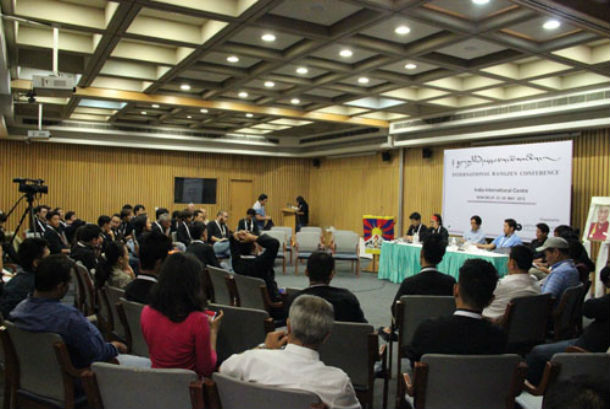 Dharamshala — On May 23, 2015 a 2-day "International Rangzen Conference" was held in Delhi, marking the anniversary of the 17 point agreement signed between China and Tibet during the initial occupation.
Dharamshala — On May 23, 2015 a 2-day "International Rangzen Conference" was held in Delhi, marking the anniversary of the 17 point agreement signed between China and Tibet during the initial occupation.
The 2-day was inaugurated by the chief guest Dr. Arun Kumar, Indian parliament member and staunch supporter of Tibetan cause.
The meeting was held at the International Hall of India in New Delhi. The meeting was organized by several Tibetan individuals as a continued effort to mark the date.
Lhasang Tsering from Dharamshala, Sonam Wangdue who lives in the United States, Gonpo Trinley, a former political prisoner from Tibet who arrived recently in India were presented gifts in recognition of their contributions made in Tibetans' struggle for independence or Rangzen.
Over 100 Tibetans, including activists, MP and journalist were attended the conference in their individual capacities. But, many were students studying in Indian universities of Gandhinagar, Baroda, Bangalore, Mysore, Delhi, and Jawaharlal Nehru university. Tibetan residents of Dharamshala and Bir in Himachal Pradesh were also among the attendees, all sharing the desire for a free Tibet.
For two days they discussed the current situation in Tibet, followed by lectures by Indian scholars. The meeting commenced with a short talk by Tibetan Youth Congress member Tenzin Tsundue who said, "Before we struggle for the rights of free Tibet, we must understand the international situation, and then we can understand the context of the Tibetan situation. Among Tibetans, there are many different ideas and desires regarding a free Tibet. But these differences are not important, what's important is that we unite for Tibet.
Organisers said, this meeting was not organized or sponsored by an organization, it is supported by individual donations. We are now a generation separated from the original occupation of Tibet, and it is this new generation that has joined the struggle and joined this meeting."
A press conference was held after the meeting to announce their 4-point resolution. The 4-points were on Tibetan freedom struggle, critical situation inside Tibet, unity among Tibetans in exile, and on garnering international support.
Tibetan Parliament member Serta Tsultim said, "My vision is for a free Tibet. In the future, I hope for a new generation to continue to understand the importance of a free Tibet.”
Indian guest Dr Kumar stated, "Chinese must stop their annihilation of Tibetan culture. Historically, Tibet is a country, it's just now that Tibet is under the forced occupation of Chinese government. But, the unique Tibetan religion, culture, and history is very easily seen.
The struggle for a free Tibet is genuine and worthy. People across the world can support this cause. After 1960, many countries have attained freedom. As Tibetans, do not neglect or underestimate the importance of the struggle for a free Tibet. The Chinese think that when His Holiness the Dalai Lama passes away, the Tibetan cause will be finished. This is unthinkable. China has occupied Tibet for 60 years now, but never give up. This is imperative. Never give up. The movement for a free Tibet is one based on pride and respect."
A few organizing members of the event put together a document detailing the purpose and goals of the meeting, stating:
In 1951, on the 23rd of May, the Chinese and Tibetans made a 17 point agreement. This agreement fails to reflect the hopes and wishes of Tibetans, as the signing was forced under great duress, which negates its legitimacy. This meeting is to acknowledge that Tibetans continue to recognize that this agreement was never truly accepted.
It's been 64 years since the forced signing of this agreement. The occupation, cultural destruction and torture of Tibetans continues. But the voice of protest also continues. The struggle's ambition for a free Tibet has not been lost. Under the Chinese occupation, so many Tibetan men and women's lives have been lost, and many more people have been tortured in jails. But, Tibet is owned by Tibetan people. This protest is growing in power.
This struggle is between the occupied and the occupiers. It is a struggle over recognizing rightful ownership. Tibetans, under the Chinese torture, still are not afraid, the struggle has not ceased. As long as we are denied our rights under Chinese occupation, the last testament of all those who have died for our struggle for freedom will continue to be heard, their hopes for a free Tibet cannot die.
So many Tibetan men and women have sacrificed their lives for the struggle for Tibetan freedom. At this time we commemorate their sacrifice, and continue our struggle.


![Tibet has a rich history as a sovereign nation until the 1950s when it was invaded by China. [Photo: File]](/images/stories/Pics-2024/March/Tibet-Nation-1940s.jpg#joomlaImage://local-images/stories/Pics-2024/March/Tibet-Nation-1940s.jpg?width=1489&height=878)















